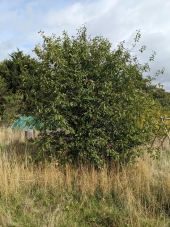We had one of those glorious late winter days here today, which feel like early Spring. Everyone's Spring crocuses are at their peak, alongside late snowdrops and early daffodils. Fat bumblebees are out browsing the flowers.
Also, the goosegrass (cleavers) is starting to grow quickly. So, as this is a reasonable indication that the soil is warming up, I sowed saved parsnip seeds. I'd had cloches in place for a week or two to help warm the soil ready.
I also did the sad task of rubbing the blossom buds off the small pear trees with the pear midge problem. Over the past three days, I've used salvaged heavy black plastic sheeting to mulch under those pear tree canopy areas too. So we have a chance of containing this outbreak, as long as the new generation of midges can't fly far enough to infest another tree.
My early potato tubers are chitting faster than I expected. I had been planning to plant them quite late (late April) as they seem to like slightly warmer conditions. But they may be too far ahead to wait that long.
Here are some of those purple crocuses, although the camera doesn't catch the "bee purple" glow the eye sees.








.jpg)
.jpg)